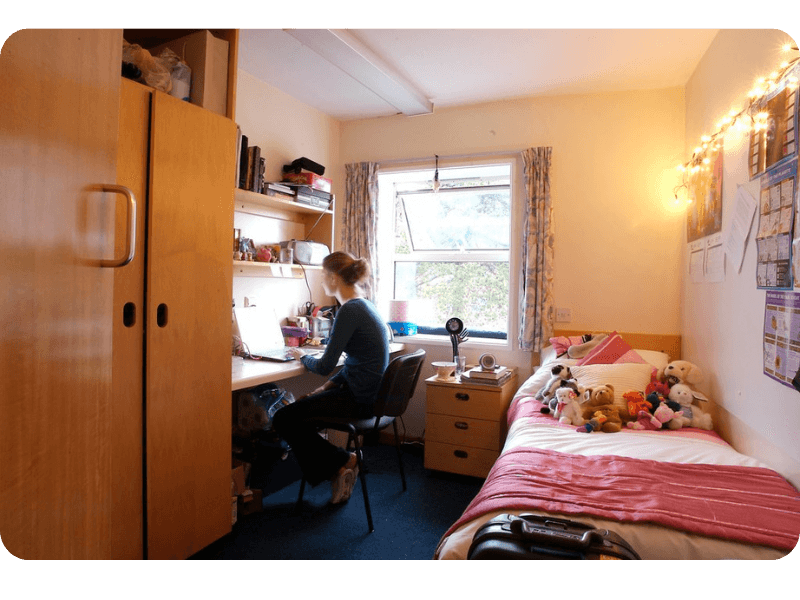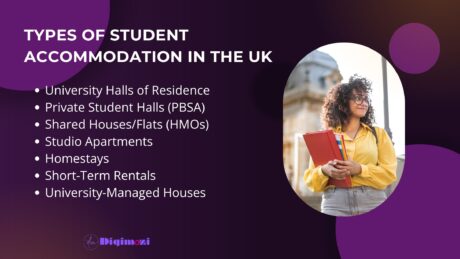There are 3 types of affordable accommodation in the UK for students. Finding affordable student accommodation in the UK as an international student can feel overwhelming, especially with rising living costs and limited budgets. With accommodation typically representing 40-60% of a student’s total expenses, making the right choice is crucial for your financial well-being and academic success.
This comprehensive guide provides up-to-date information on the most cost-effective student accommodation options in the UK for the 2025-2026 academic year, helping you make informed decisions that balance affordability with comfort and convenience.
Understanding UK Student Accommodation Costs (2025-2026)
Current Market Overview
The UK student accommodation market has undergone significant changes in 2024-2025, with costs varying dramatically by location and type of accommodation. Recent data indicate that students should budget between £1,425 and £2,035 per month for living expenses, with accommodation accounting for the largest portion of this budget.
Average Monthly Accommodation Costs:
- London: £800-£1,500+ per month
- Major cities (Manchester, Birmingham, Edinburgh): £400-£800 per month
- Smaller university towns: £300-£600 per month
- Shared accommodation: £250-£500 per month (outside London)
Factors Affecting Accommodation Costs
Several key factors influence accommodation pricing across the UK:
- Location proximity to campus significantly impacts costs, with properties within walking distance commanding premium prices.
- Seasonal demand creates price fluctuations, with September intake periods seeing the highest rates.
- Property condition and amenities such as ensuite bathrooms, modern furnishing, and included utilities can double accommodation costs.
- Regional economic factors also play a crucial role, with areas experiencing job growth and development seeing corresponding increases in student accommodation prices.
Types of Affordable Student Accommodation
1. University Halls of Residence

University-managed accommodation often provides the most affordable choice for international students for first-year international students. These typically range from £90-£200 per week, depending on location and facilities.
Advantages:
- Guaranteed accommodation, inclusive utility bills, built-in support systems, and opportunities for social integration.
- Standard rooms with shared bathrooms represent the most affordable option, while ensuite rooms offer privacy at a moderate price increase.
Many universities offer catered halls, where meals are included in the accommodation fee, providing excellent value for money and helping with budgeting.

Sharing private rental properties with other students often offers the best value for money and a cost-effective choice, particularly for second and third-year students. Monthly costs typically range from £250-£500 per person outside London.
House sharing benefits:
- Independent living with lower individual costs
- Freedom to choose housemates
- Access to local student-friendly areas
Essential considerations include understanding UK tenancy laws, deposit requirements (typically 1-6 weeks’ rent), and ensuring all bills and responsibilities are clearly defined.
Popular areas for student house shares include neighborhoods with good transport links to universities, established student populations, and local amenities.
3. Purpose-Built Student Accommodation (PBSA)
Private student accommodation providers offer modern facilities specifically designed for students. While often more expensive than traditional options, PBSA can provide good value when utilities, internet, and amenities are included.
PBSA advantages encompass all-inclusive pricing, modern facilities, 24/7 security, and professional management. Cost considerations should factor in what’s included in the rent versus additional expenses in other accommodation types.
Alternative Accommodation Options
- Homestay arrangements with local families can provide cultural immersion alongside affordable accommodation, typically costing £400-£700 per month, including meals.
- Student cooperatives and housing associations sometimes offer below-market rates for students willing to contribute to community maintenance and activities.
- Short-term and flexible options such as Airbnb or serviced apartments can bridge gaps between permanent accommodation or provide temporary solutions while searching for long-term housing.
Regional Cost Breakdown
London Accommodation
London remains the most expensive city for student accommodation, but strategic choices can significantly reduce costs:
Zone 2-4 areas offer better value while maintaining good transport links to central universities. East London boroughs such as Tower Hamlets and Newham provide more affordable options with improved infrastructure.
Shared accommodation in London typically costs £600-£900 per month per person, while university halls range from £150-£300 per week.
Northern England Cities
Manchester, Liverpool, and Leeds offer excellent value for money with vibrant student communities:
- Manchester: £300-£600 per month for shared housing
- Liverpool: £250-£500 per month for private accommodation
- Leeds: £280-£550 per month, depending on area proximity to universities
Scotland
Edinburgh and Glasgow provide world-class education with more reasonable accommodation costs than southern England:
- Edinburgh: £350-£700 per month for student accommodation
- Glasgow: £300-£600 per month with excellent transport networks
- Scottish university towns like St. Andrews and Stirling offer even more affordable options
Wales and Northern Ireland
Cardiff, Swansea, Belfast, and other Welsh/Northern Irish cities represent some of the UK’s best value destinations for international students, with accommodation costs 20-40% lower than equivalent English cities.
Reional cost break down summary
| Region | Accommodation Type | Monthly Cost | Features |
|---|---|---|---|
| London | Shared/University Halls | £600–£900 / £150–£300 per week | Proximity to Zone 2-4 for savings |
| Manchester | Shared Housing | £300–£600 | Vibrant student areas like Fallowfield |
| Edinburgh, Scotland | Shared/Student Flats | £350–£700 | Affordable compared to southern cities |
| Belfast, Northern Ireland | Various Options | £250–£450 | Some of the UK’s lowest rent costs |
Money-Saving Strategies
Early Application Benefits
Applying for accommodation early in the academic year provides access to the widest range of affordable options. University accommodation applications typically open in January-March for the September intake.
Early bird discounts and guaranteed placement schemes reward prompt applications with reduced rates and priority placement.
Understanding Inclusive vs. Non-Inclusive Pricing
Bills-included accommodation might appear more expensive initially, but can provide better value and budgeting simplicity. Separate utility arrangements require careful budgeting for gas, electricity, water, internet, and council tax exemptions.
Location Strategy
Transport cost calculations should factor into accommodation decisions. Slightly more expensive accommodation with better transport links might provide overall savings compared to cheaper distant options requiring expensive daily commuting.
Bicycle-friendly areas can eliminate transport costs entirely while providing health and environmental benefits.
Coordinating with housemates for bulk food purchases, shared household items, and group contracts for utilities can significantly reduce individual costs.
Student discount schemes for local services, gyms, and entertainment should be factored into location decisions.
Legal Considerations for International Students
Tenancy Rights and Responsibilities
International students have the same rental rights as UK residents, including protection from unfair eviction, deposit protection requirements, and habitability standards.
Assured Shorthold Tenancies (AST) represent the most common rental agreement type, typically running for 12 months with specific terms for ending agreements early.
Deposit Protection
UK law requires landlords to protect tenant deposits in government-approved schemes. Deposit amounts typically range from one to six weeks’ rent, and protection documentation must be provided within 30 days of payment.
Documentation Requirements
International students need valid visa documentation, proof of university enrollment, bank statements or financial guarantees, and sometimes UK guarantor arrangements or rent payment in advance.
Practical Application Tips
Accommodation Search Timeline
January-March: Begin researching options and applying for university accommodation April-June: Confirm university housing or begin private accommodation search July-August: Finalize arrangements and prepare for arrival September: Move-in period with final arrangements
Essential Questions for Accommodation Providers
Before committing to any accommodation, international students should clarify total monthly costs including all bills, contract length and break clauses, deposit requirements and protection, house rules and restrictions, and maintenance and support arrangements.
Red Flags to Avoid
Be cautious of requests for large upfront payments without viewing properties, unmarked or unregistered accommodation providers, properties significantly below market rates without clear explanation, and landlords unwilling to provide proper documentation or references.
Support Resources
University Accommodation Services
Most UK universities provide dedicated international student support, accommodation guarantee schemes for first-year students, emergency accommodation assistance, and mediation services for accommodation disputes.
External Support Organizations
Citizens Advice provides free guidance on housing rights and responsibilities. Shelter offers specialized housing advice and support services. National Union of Students (NUS) provides advocacy and guidance on student-specific accommodation issues.
Local council housing departments can provide information about housing standards, licensing requirements, and tenant rights in specific areas.
Budgeting and Financial Planning
Creating a Realistic Budget
International students should allocate 50-60% of living expenses for accommodation costs, factor in one-time setup costs including deposits, furniture, and connection fees, and maintain emergency funds equivalent to 2-3 months of accommodation costs.
Currency fluctuation considerations are particularly important for international students, as exchange rate changes can impact accommodation affordability throughout the academic year.
Financial Support Options
Some universities offer hardship funds and emergency accommodation assistance for students experiencing financial difficulties. Part-time work opportunities can supplement accommodation budgets, subject to visa restrictions for international students.
Scholarship and bursary programs sometimes include accommodation allowances or partnerships with local accommodation providers.
If you’re planning to study in cities like Glasgow, Leeds, Nottingham, or Newcastle, finding the right place to live is just as important as choosing your university. Check out our student guide for accommodation to explore the best areas, typical rent costs, and tips for securing a good deal early.
Want to know what it’s like to live and study in top UK cities? Check out our detailed city guides for students.
Not sure what kind of housing suits your lifestyle best? Whether you prefer the social buzz of uni halls or the independence of private rentals, our article on the types of student accommodation available in the UK will help you make an informed choice before you move.
Conclusion
Finding affordable student accommodation in the UK requires careful planning, early action, and thorough research. By understanding the market, exploring all available options, and implementing smart money-saving strategies, international students can secure comfortable and affordable housing that supports their academic success.
The key to success lies in starting your search early, understanding your legal rights and responsibilities, and making informed decisions based on total costs rather than headline rental prices. With proper preparation and the right approach, you can find accommodation that provides both value for money and a positive living experience during your studies in the UK.
Remember that accommodation is not just about cost – it’s about creating a foundation for your academic success and personal growth during your time as an international student in the UK. Choose wisely, plan carefully, and don’t hesitate to seek support when needed.
This guide provides general information based on 2024-2025 market data. Costs and availability can vary significantly by location and timing. Always verify current information with accommodation providers and university support services before making final decisions.
FAQ
What is the cheapest type of accommodation for students in the UK?
Shared housing outside of London is often the most affordable option, ranging from £250–£500 per person per month depending on location.
What’s the best option for first-year international students?
University halls are usually best as they often provide guaranteed placements, simple applications, all-inclusive costs, and a supportive environment.
Is bills-included housing worth it?
It can be! Bills-included accommodation simplifies budgeting and can save you from unexpected increases in utility costs, particularly during winter.
When should I start looking for accommodation?
Start as early as January (if you’re starting in September). This ensures access to the most affordable options and helps avoid the last-minute rush.
How can I avoid accommodation scams?
Never send money without viewing a property.
Verify landlords and tenancy agreements through proper channels like the NRLA (National Residential Landlords Association).
Avoid individual listings that seem significantly below market rates.





